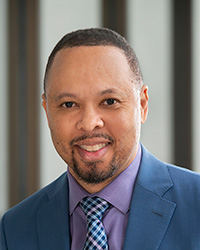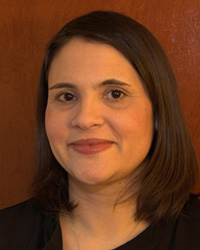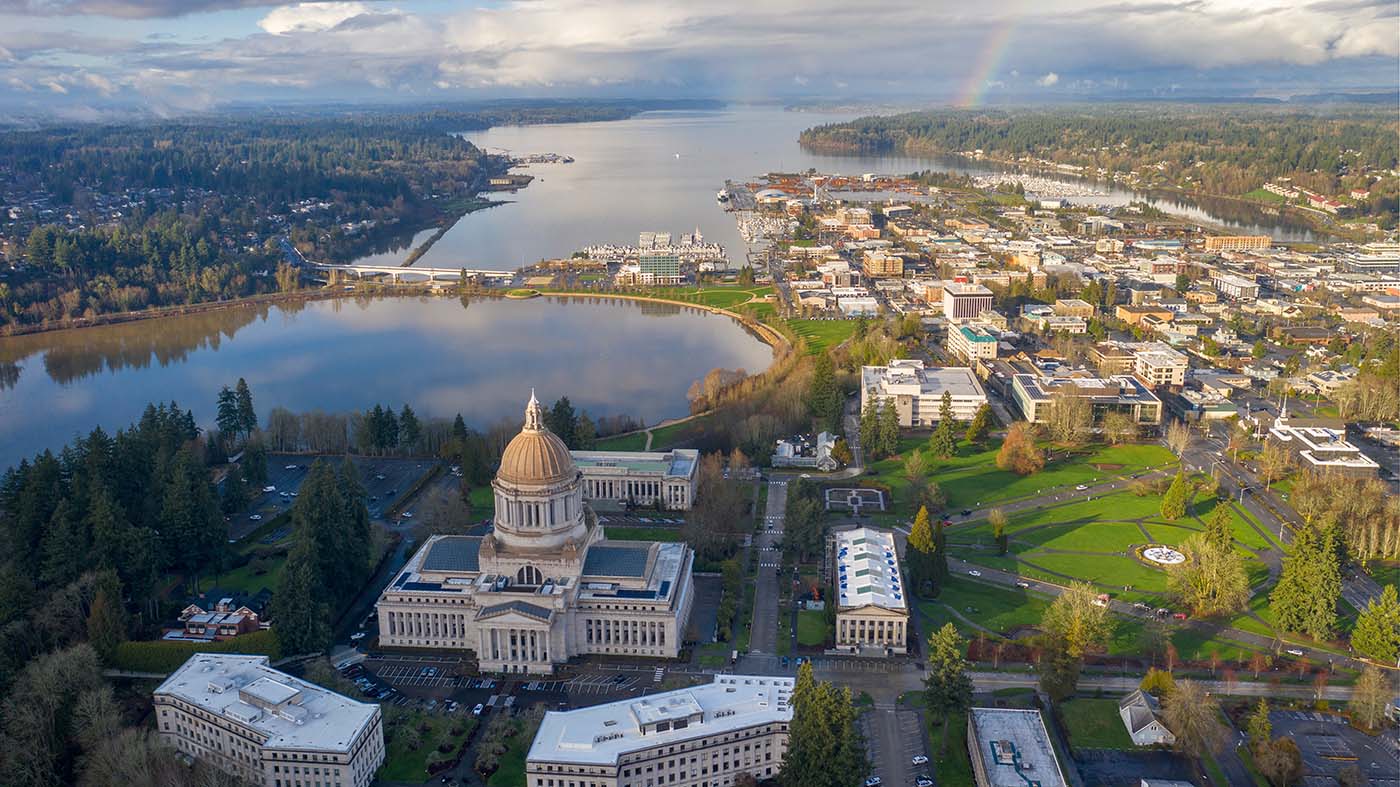In Olympia, Larry Jefferson '94 and Sara Robbins '07 head the state agencies responsible for providing legal representation for clients who cannot pay
This story originally appeared in Lawyer, Spring 2024.
Seattle U Law alumni lead Washington’s indigent legal services
For those who find themselves in need of an attorney but cannot afford one, indigent legal services provided by Washington state are a critical lifeline.
Two Seattle University School of Law alumni are at the helm of the state agencies responsible for making equal justice a reality in Washington, and they are working to ensure that their dedicated lawyers remain effective and accessible regardless of clients’ ability to pay, both now and in the future.

A longtime public defender, Larry Jefferson '94 was appointed in 2021 to serve as director of the Washington State Office of Public Defense (OPD), which contracts with attorneys around the state to provide free legal representation for people charged in criminal matters.

Meanwhile, this past winter, Sara Robbins ’07 was appointed head of the civil counterpart to Jefferson’s office, the Washington State Office of Civil Legal Aid (OCLA).
“Each of these entities plays a very important role — one is the state voice for public defense, and the other is the state voice for legal aid,” said Paul Holland, associate dean for Experiential Learning. “The role of these offices is to champion the importance of equal justice for all, to promote careers in indigent defense, and to find ways to support those who have dedicated themselves to working in the field.”
Although they operate in different spheres, both organizations have much in common.
“Even for general access to the legal system, if you are low-income or indigent, there are quite a few barriers — the biggest being how expensive it is,” Robbins said. “Access to our courts and legal system is often out of reach.”
In criminal matters, the 1963 U.S. Supreme Court decision in Gideon v. Wainwright affirmed that the U.S. Constitution guarantees every defendant the right to an attorney, with counsel provided by the state for those who cannot afford one.
While there is no equivalent case for civil legal aid, the federal Legal Services Corporation was established in 1974 to send funds from Congress to civil legal aid programs around the nation. The Washington State Legislature set up a similar statewide program in 2005 with the creation of OCLA, which distributes state funds to legal aid groups in every county. Although the stakes in criminal cases may seem more obvious to some, obtaining cost-free legal representation for civil matters can still be lifechanging.
“Having an attorney who makes sure the law is followed can mean the difference between somebody being able to stay in their home, or being able to maintain their source of income, or their health care, or their social security,” Robbins said.
Despite the guarantees of Gideon, Washington state has a severe public defender shortage, resulting in long waits for lawyers and frequent attorney turnover on existing cases. For lawyers, higher caseloads lead to stress and burnout, causing them to leave the field and worsening the problem for those who stay behind.
Jefferson recently wrote a letter to the Washington Supreme Court advocating for relief, including lowering caseloads “to save the public defenders we have left.” The court denied the request, reasoning that with lower caseloads, there would not be enough public defenders to meet demand.
However, the Legislature passed a bill this past session to set up an OPD program that creates opportunities for recent law school graduates and law students to work in and intern with public defense offices in rural areas of the state, sometimes called “legal deserts,” where there are not enough legal providers. Seattle U Law will serve as a partner school in the program.
Another Seattle U Law-involved effort to strengthen the legal infrastructure in underserved communities is the Law School Admission Council (LSAC) Prelaw Undergraduate Scholars (PLUS) Program, a partnership between Heritage University (near Yakima), the Northwest Justice Project, and the state’s three law schools that encourages Latinx and Indigenous students from Central Washington to consider law school and legal careers. One goal of the initiative is to educate Spanish-speaking attorneys to alleviate critical shortages in the region.
“Those efforts work to change the world. You’re getting a more diverse student body, more diverse attorneys, and then more diversity of action in court,” Jefferson said. “And if we bring it to where people live, it will completely change that community, because they’ll have more access to legal services.”
Resources are also a constant issue for OCLA. Robbins spends many days at the Legislature “relaying what the impact of civil legal aid is on our state and informing legislators of its importance.”
“We know that we don’t have enough attorneys on the ground to fully assist in all of the legal issues that low-income individuals around the state are facing,” Robbins said
One of the most critical areas of need is in evictions. With statewide eviction filings up considerably since pandemic-related protections lapsed, the Legislature recently granted OCLA’s funding request to add 10 additional attorneys to its Right to Counsel program, to assist low-income tenants facing eviction.
Working together
There is frequent overlap in the services provided by OCLA and OPD. Jefferson said because a person in need of a public defender often also needs help with civil issues, he is working to create a one-stop-shop at OPD, where clients can obtain public defense counsel along with aid for other issues, including drug and alcohol rehabilitation, housing support, or immigration services.
“Clients come in with all sorts of needs,” he said. “If I can connect people with support, then we can win without going to trial.”
Robbins’ office also helps with these civil issues.
“What OCLA tries to do is be there as a resource for people who have civil legal problems and need advocacy and assistance through that legal problem — someone being evicted from their home, someone needing protection order advocacy, family law or consumer law issues,” Robbins said.
Seattle U Law values
In Holland’s view, it is no coincidence that these two statewide voices for equal justice are Seattle U Law graduates. Both embrace the social justice values emphasized in their legal education.
“It directly reflects on the kinds of people who attend our law school and the kinds of careers that our graduates pursue and succeed at,” he said. “They know that Seattle U Law values this work because of our Jesuit mission and our genuine dedication to public service.”
“I chose Seattle U Law because I wanted to be in a school with peers and professors who cared about the same issues that I cared about,” Robbins said. “There’s definitely a culture around using your law degree for social justice that was influential.”
Seattle U Law has a long tradition of cultivating graduates who pursue public interest careers. Both statewide and nationally, Seattle U Law alumni are employed at many legal aid organizations. Malou Chávez ’10 directs the Northwest Immigrant Rights Project, which helps immigrants obtain legal residency. Twyla Carter ’07 heads the New York Legal Aid Society, the nation’s oldest and largest provider of legal aid. Seattle U Law students are supported by prestigious programs like the Justice John Paul Stevens Fellowship, Scholars for Justice, the Pro Bono Pledge, and Public Interest Law Foundation grants.
“Historically, our graduates have done community-based, public service work before they even get here,” Holland said. “That equips them for success, and to know that these very difficult but rewarding careers are the place where they want to go.”
Jefferson noted that public defenders do not choose their line of work for money or fame.
“It’s because they love their work, they love their clients, and they love the Constitution,” he said.

